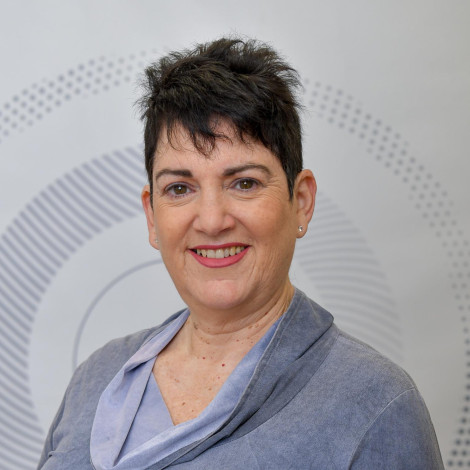
ד"ר איריס אלישע-פרימו
ד"ר איריס אלישע-פרימו הצטרפה לסגל היחידה לאנגלית כשפה זרה באוניברסיטת בר־אילן בשנת 2000 ומתמחה בתחומים של רכישת שפה ראשונה וכתיבה אקדמית. היא מרכזת קורסי הקיץ ביחידה וראש ועדת כתיבת מבחנים לרמת מתקדמים ב' (כולל מבחנים לליקויי למידה).
קורות חיים
ד"ר איריס אלישע-פרימו השלימה תואר ראשון בבלשנות אנגלית וצרפתית באוניברסיטאית בר־אילן (1986–1990) ותואר שלישי במסלול ישיר ובחסות מלגת פולברייט ללמודים לתואר שלישי בחו"ל (1990–1995) בבלשנות עם התמחות ברכישת שפה ראשונה ב־Graduate Faculty in Linguistics of the City University of New York ((1990–1997. את עבודת הדוקטורט כתבה בנושא: Functional Categories and Null Subjects in Hebrew and Child Hebrew.
ד"ר אלישע-פרימו מרכזת את קורסי הקיץ ביחידה לאנגלית כשפה זרה (2000–היום) ומכהנת כיושבת ראש ועדת כתיבת מבחנים לרמת פטור (כולל ליקויי למידה). היא שימשה נציגת הסגל הזוטר בסנאט (2011–2015) וגזברית של ארגון הסגל הזוטר (2013–2014) באוניברסיטת בר־אילן.
על הוראתה זכתה ד"ר אלישע-פרימו במגוון פרסים, ובהם: פרס דקן הפקולטה למדעי הרוח ורקטור אוניברסיטת בר־אילן ל"הצטיינות בהוראה לסגל הבכיר במסלול המקביל" (2016); פרס דקן הפקולטה למדעי הרוח ורקטור אוניברסיטת בר־אילן ל"הצטיינות בהוראה" (2015); פרס סגן רקטור אוניברסיטת בר־אילן ל"מרצה מצטיינת" (2010) ופרס רקטור אוניברסיטת בר־אילן ל"הצטיינות בהוראה" (1999–2013).
מחקר
תחום ההתמחות שלי הוא הוראת אנגלית כשפה זרה ולמטרות אקדמיות, וכן הוראת כתיבה אקדמית לתארים מתקדמים. העניין שלי בתחום התחיל מהבית – סבתא שלי היתה מורה לשפות והורי עבדו בחו"ל מטעם מדינת ישראל, ולכן דיברו כמה שפות והעבירו אלי את האהבה לשפה ואת החשיבות של ידיעת שפות נוספות בעולם הגלובאלי. לאור העובדה שרוב המחקרים שסטודנטים וסטודנטיות נחשפים להם כתובים באנגלית, הוראת שפה זו באוניברסיטה עולה בקנה אחד עם מטרותיו של מוסד להשכלה גבוהה בהקניית כלים וידע תוך שימת דגש על קריאה וכתיבה ביקורתית באנגלית.
העבודה בקורסי האנגלית בהוראתי מתמקדת בכל מיומנויות השפה (קריאה, כתובה, דיבור ושמיעה) בדגש על היבטים הביקורתיים והחשיבתיים. במילים אחרות, בשיעורים אנו קוראים ומנתחים טקסים לא רק לשם הבנתם, אלא לשם העמקה, יישום בכתיבה ובדיבור, ובסופו של דבר, שילובם בתוצרים מחקריים ומקצועיים.
ביחידה לאנגלית כשפה זרה הקדשנו חשיבה על רב־תרבותיות, גיוון והכלה ופתחנו יחידות לימוד בהתאם. סטודנטים וסטודנטיות עם ליקויי למידה משתלבים בכל הקורסים באנגלית. בהתאם להנחיות של מדור תמיכה והנגשה, הם מקבלים את הזכויות שמגיעות להם, כגון התעלמות משגיאות כתיב, הארכת זמן במבחנים, שאלון מוקלט ואפילו הקראה אישית, וכל זאת תוך למידה משמעותית ועמידה בכל יעדיי הקורסים. זאת ועוד, במסגרת "תקווה ישראלית באקדמיה", בצוות מרצים מצומצם, יצרנו וכתבנו יחידות הוראה בנושא רגישות ומודעות רב־תרבותית (2020), הפרויקט הוצג בשני כנסים בין־לאומיים בחו"ל (ICERI2021 ו־EDULEARN2021) ובכנס בין־לאומי ראשון שנערך באוניברסיטת בר־אילן בנושא רב־תרבותיות, גיוון והכלה: הרחבת נגישות והשתתפות במערכות חינוך (2023). כמו כן, דיווחנו על הפרויקט בכנס "קהילת מעצבי העתיד" באוניברסיטת בר־אילן (למידה מבוססת פרויקט: רגישות רב־תרבותית באנגלית כשפה זרה,2021).
קורסים
אנגלית אקדמית לרמות מתקדמים (א' ו ב')
אנגלית אקדמית לתארים מתקדמים: תואר שני
אנגלית אקדמית לתארים מתקדמים: תואר שלישי
אנגלית משפטית
בלשנות: קורסי מבוא
בלשנות: רכישת שפה ראשונה
פירסומים
- Elisha-Primo, I., Sandler, S., Tauber-Levy, N., Burstein-Feldman, Z. Lyubman, A. (2021).Multicultural Sensitivity – Hope During COVID-19. Proceedings ICERI2021 14th Annual International Conference of Education, Research and Innovation
- Elisha-Primo, I., Sandler, S., Burstein-Feldman, Z. Lyubman, A. Tauber-Levy, N. (2021). Creating Connections Despite Social Distancing. Proceedings EDULEARN21 Connecting Technology with Education
- Elisha-Primo, I., Sandler, S., Goldfrad, K. (2015). Listening to More Voices: Why Being Heard Matters. TESL-EJ, 19:3. [http://www.tesl-ej.org/wordpress/issues/volume19/ej75/ej75a4/]
- Elisha-Primo, I., Sandler, S., Goldfrad, K., Ferenz, O., Perpignan, H. (2010). Listening to Students’ Voices: A Curriculum Renewal Project for an EFL Graduate Academic Program. System, 38, 457-466.
תאריך עדכון אחרון : 18/01/2024



